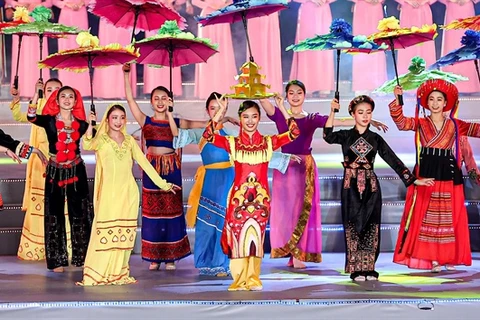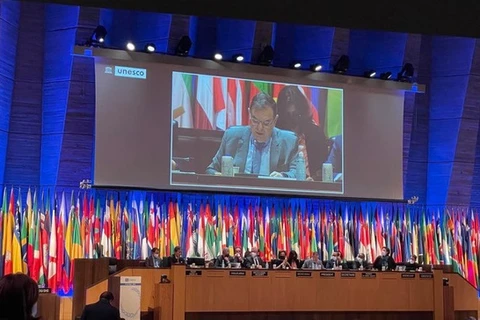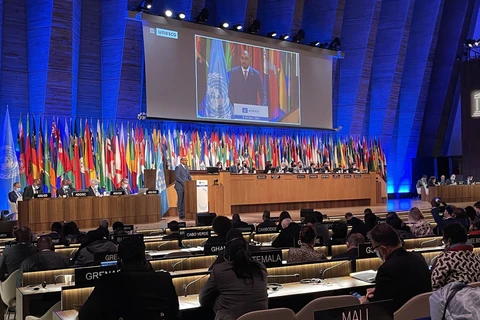Hanoi (VNA) – UNESCO has decided to commemorate the birth and death anniversaries of classical poets Nguyen Dinh Chieu and Ho Xuan Huong. This demonstrates the organisation’s recognition, as well as that of the international community, of Vietnam’s cultural and ethical values, along with the traditional fondness for learning and philosophy of gender equality and liberation of women.
So said Deputy Minister of Foreign Affairs Dang Hoang Giang, who is also Chairman of the National Commission for UNESCO, while talking to the press about the decision adopted on November 23 as part of the 41st session of the UNESCO General Conference in Paris.
According to Giang, the Ministry of Foreign Affairs and the Vietnam National Commission for UNESCO coordinated with relevant departments and agencies in 2020 on the decisiion. These include authorities of Ben Tre and Nghe An provinces, where the two figures used to live in, as well as scientists who completed two dossiers for submission to UNESCO to commemorate Ho Xuan Huong’s 250th birth and 200th death anniversaries and Nguyen Dinh Chieu’s 200th death anniversary. Two dossiers were submitted to UNESCO in December 2020 in accordance with regulations.
The dossier building and submission also illustrated Vietnam’s efforts to intensively integrate into the world, the official said, emphasising Party General Secretary Nguyen Phu Trong’s request for the continued building, preservation, and development of an advanced culture deeply imbued with national identity, which was made at the recent National Culture Conference.
 President of the UNESCO General Conference Santiago Irazabal Mourao hammers to approve a resolution, under which UNESCO will jointly honour and commemorate birth/death anniversaries of two Vietnamese poets (Photo: Ministry of Foreign Affairs) In the 41st UNESCO General Conference, UNESCO decided that Ho Xuan Huong and Nguyen Dinh Chieu are among the World Cultural Celebrities whose birth and death anniversaries will be commemorated by the global organisation between 2022 and 2023, stated Giang.
President of the UNESCO General Conference Santiago Irazabal Mourao hammers to approve a resolution, under which UNESCO will jointly honour and commemorate birth/death anniversaries of two Vietnamese poets (Photo: Ministry of Foreign Affairs) In the 41st UNESCO General Conference, UNESCO decided that Ho Xuan Huong and Nguyen Dinh Chieu are among the World Cultural Celebrities whose birth and death anniversaries will be commemorated by the global organisation between 2022 and 2023, stated Giang.
Accordingly, the 200th birth anniversary of Nguyen Dinh Chieu (1822 - 1888), and the 250th birthday and the 200th death anniversary of Ho Xuan Huong (1772 - 1822) will be marked in 2022.
Giang noted that the organisation of activities in honour of the two poets will help introduce the people and culture of Vietnam to international friends, enrich the spiritual life of Vietnamese people, and spread the values of compassion, humanism, and justice in the country’s society.
Nguyen Dinh Chieu, also known as Scholar Chieu, Trong Phu and Hoi Trai, (1822 – 1888), was born in Binh Duong district, Gia Dinh province (now District 1, Ho Chi Minh City).
The blind poet was not only known for his nationalist and anti-colonial writings against the French colonisation of Cochinchina and his exemplary teaching, but also as a popular medical practitioner. He is a typical example for people with disabilities around the world. Despite being blind, he studied Confucianism and Oriental medicine from relatives.
His typical work of Luc Van Tien (The Tale of Luc Van Tien) is an epic poem written in Nom (the old Chinese-based Vietnamese script) in the 1850s. It is regarded as one of the two most recognisable and influential epic poems in Vietnamese history, besides Truyen Kieu (The Tale of Kieu) by great poet Nguyen Du.
His poems tell about the people’s worries during wartime, their war injuries and losses.
Ho Xuan Huong (1772-1822), whose name means “Spring Essence”, is also one of the most important poets in Vietnam’s history.
Born in the time of feudalism, which disregarded the role of women, she became renowned for her poetic skills, especially her subtly risqué poems which used double-entendres and sexual innuendos to comment on several social, religious and political issues.
A concubine, she had the courage to mention topics which were taboo for women at that time.
Previously, the UNESCO commemorated birth anniversaries of several Vietnamese celebrities, namely President Ho Chi Minh, educator Chu Van An, and poets Nguyen Du and Nguyen Trai./.
So said Deputy Minister of Foreign Affairs Dang Hoang Giang, who is also Chairman of the National Commission for UNESCO, while talking to the press about the decision adopted on November 23 as part of the 41st session of the UNESCO General Conference in Paris.
According to Giang, the Ministry of Foreign Affairs and the Vietnam National Commission for UNESCO coordinated with relevant departments and agencies in 2020 on the decisiion. These include authorities of Ben Tre and Nghe An provinces, where the two figures used to live in, as well as scientists who completed two dossiers for submission to UNESCO to commemorate Ho Xuan Huong’s 250th birth and 200th death anniversaries and Nguyen Dinh Chieu’s 200th death anniversary. Two dossiers were submitted to UNESCO in December 2020 in accordance with regulations.
The dossier building and submission also illustrated Vietnam’s efforts to intensively integrate into the world, the official said, emphasising Party General Secretary Nguyen Phu Trong’s request for the continued building, preservation, and development of an advanced culture deeply imbued with national identity, which was made at the recent National Culture Conference.
 President of the UNESCO General Conference Santiago Irazabal Mourao hammers to approve a resolution, under which UNESCO will jointly honour and commemorate birth/death anniversaries of two Vietnamese poets (Photo: Ministry of Foreign Affairs)
President of the UNESCO General Conference Santiago Irazabal Mourao hammers to approve a resolution, under which UNESCO will jointly honour and commemorate birth/death anniversaries of two Vietnamese poets (Photo: Ministry of Foreign Affairs) Accordingly, the 200th birth anniversary of Nguyen Dinh Chieu (1822 - 1888), and the 250th birthday and the 200th death anniversary of Ho Xuan Huong (1772 - 1822) will be marked in 2022.
Giang noted that the organisation of activities in honour of the two poets will help introduce the people and culture of Vietnam to international friends, enrich the spiritual life of Vietnamese people, and spread the values of compassion, humanism, and justice in the country’s society.
Nguyen Dinh Chieu, also known as Scholar Chieu, Trong Phu and Hoi Trai, (1822 – 1888), was born in Binh Duong district, Gia Dinh province (now District 1, Ho Chi Minh City).
The blind poet was not only known for his nationalist and anti-colonial writings against the French colonisation of Cochinchina and his exemplary teaching, but also as a popular medical practitioner. He is a typical example for people with disabilities around the world. Despite being blind, he studied Confucianism and Oriental medicine from relatives.
His typical work of Luc Van Tien (The Tale of Luc Van Tien) is an epic poem written in Nom (the old Chinese-based Vietnamese script) in the 1850s. It is regarded as one of the two most recognisable and influential epic poems in Vietnamese history, besides Truyen Kieu (The Tale of Kieu) by great poet Nguyen Du.
His poems tell about the people’s worries during wartime, their war injuries and losses.
Ho Xuan Huong (1772-1822), whose name means “Spring Essence”, is also one of the most important poets in Vietnam’s history.
Born in the time of feudalism, which disregarded the role of women, she became renowned for her poetic skills, especially her subtly risqué poems which used double-entendres and sexual innuendos to comment on several social, religious and political issues.
A concubine, she had the courage to mention topics which were taboo for women at that time.
Previously, the UNESCO commemorated birth anniversaries of several Vietnamese celebrities, namely President Ho Chi Minh, educator Chu Van An, and poets Nguyen Du and Nguyen Trai./.
VNA


























